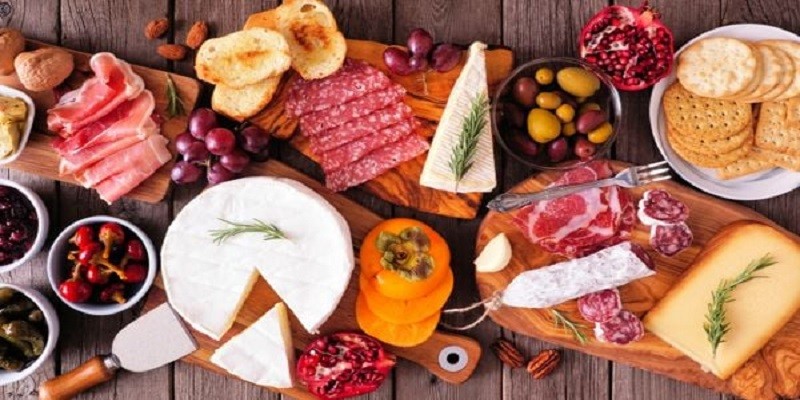Yes, you can eat charcuterie while pregnant, but with some precautions. Certain cured and uncooked meats should be avoided due to the risk of listeria and other foodborne illnesses.
Pregnancy comes with a long list of dietary restrictions, and charcuterie boards, with their assortment of cured meats, soft cheeses, and other delicacies, may seem off-limits. However, with a few adjustments, expectant mothers can still enjoy this delightful spread while prioritizing their and their baby’s health.
What is Charcuterie?
Charcuterie is a French term that refers to a branch of cooking devoted to prepared meat products, such as bacon, ham, sausages, terrines, and pâtés. These items are typically made from pork, beef, or a combination of meats, and are often cured, smoked, or cooked. Charcuterie boards feature an assortment of these meats, along with accompaniments like cheeses, fruits, nuts, and crackers.
Nutritional Value of Charcuterie
| Nutritional Value | Details |
|---|---|
| Protein | Charcuterie meats are an excellent source of high-quality protein, essential for fetal development. |
| Iron | Many cured meats are rich in iron, which is crucial for preventing anemia during pregnancy. |
| Vitamins & Minerals | Depending on the type, charcuterie can provide vitamins like B12, zinc, and selenium. |
Risks of Eating Charcuterie During Pregnancy
Safe Ways to Eating Charcuterie During Pregnancy
When it comes to charcuterie during pregnancy, moderation and caution are key. Opt for fully cooked meats like hot dogs or sausages, and avoid undercooked or cured meats like prosciutto or salami. Ensure all meats are heated to an internal temperature of 165°F (74°C) to kill any potential bacteria. Stick to pasteurized cheeses and thoroughly wash any fruits or vegetables.
Alternatives to Charcuterie During Pregnancy
| Alternatives | Precautions |
|---|---|
| Grilled or roasted meats | Ensure proper cooking temperature |
| Hard or semi-soft pasteurized cheeses | Avoid unpasteurized varieties |
| Fresh fruits and vegetables | Wash thoroughly |
| Whole grains and nuts | Check for any recalls or contamination |
Experts Tips
- “While it’s best to avoid deli meats and soft cheeses during pregnancy, you can still enjoy a charcuterie board by opting for fully cooked meats and pasteurized cheeses.”
- “Heating deli meats until steaming hot can help reduce the risk of listeria, but it’s still safest to avoid them altogether during pregnancy.”
- “When in doubt, skip the charcuterie board and opt for a safer alternative, like grilled chicken or fish with fresh veggies and hummus.”
FAQs
Can I eat prosciutto while pregnant?
No, it’s best to avoid cured meats like prosciutto during pregnancy due to the risk of listeria contamination. Opt for fully-cooked ham or turkey instead.
Are soft cheeses like brie safe during pregnancy?
Soft cheeses made with unpasteurized milk should be avoided during pregnancy, as they may contain harmful bacteria. Stick to pasteurized varieties like cream cheese or hard cheeses.
Can I eat smoked salmon on a charcuterie board while pregnant?
Smoked salmon is generally safe to consume during pregnancy, but it’s best to avoid any that is undercooked or from an unreliable source.
Is it safe to eat deli meat during pregnancy if I heat it up?
Heating deli meat until steaming hot can reduce the risk of listeria, but it’s still safest to avoid it altogether during pregnancy.
Can I eat pâtés or terrines while pregnant?
No, pâtés and terrines are made with raw or undercooked meats and should be avoided during pregnancy due to the risk of foodborne illnesses.
Conclusion
While charcuterie boards may seem off-limits during pregnancy, expectant mothers can still enjoy a modified version by opting for fully cooked meats, pasteurized cheeses, and fresh fruits and vegetables. With a few precautions and adjustments, this delightful spread can be a safe and enjoyable indulgence throughout the nine months.
Last Updated on May 25, 2024 by Marjorie R. Rogers, MA (English), Certified Consultant

